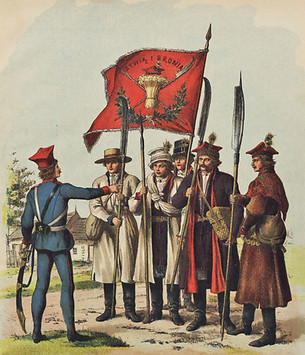
The Occupation of Europe
A continent under the French boot
"The attribute of popular government in revolution is at one and the same time virtue and terror, virtue without which terror is fatal, terror without which virtue is impotent. The terror is nothing but justice, prompt, severe, inflexible; it is thus an emanation of virtue."
-Maximilien Robespierre
Revolutionary France and the French Empire secured control over a vast swathe of the European continent. French influence had to be enforced in all aspects of society and government.
Administrative Integration
Although the signing of treaties brought a formal end to hostilities, the effects of war remained. Subjugated nations became restless and agitated due to arbitrary taxation and totalitarian reform programs. Controlling this unrest was crucial to maintaining the French Empire. Consequently, native bourgeois administrators were appointed who were placated through land grants or appeals to ambition. Once a stable government had been established, a thorough audit was undertaken to allow the French government to fine-tune occupation policy and further maintain order.
Napoleon's devolution of local affairs to local governments while maintaining strong imperial authority allowed his Empire to remain remarkably stable during his reign. A Prussian ambassador named Küstler remarked:
"The main feature [of the French Empire] is the felicitous unity of the administration... its simplicity, rapidity and energy cannot fail to achieve full success."
"A means of softening the foreign yoke in the eyes of the Germans was to propose a man of repute who spoke their language, shared their tastes and even their weaknesses."
Jacques Claude Beugnot

Napoleon attends the Cisalpine Council, the legislative body of the Cisalpine Republic in northern Italy.
Military Occupation
Conquering a nation's territory is one thing; conquering its people is another. Very few populaces willingly welcomed the arrival of French armies in their land, especially if they had been subjected to hardship by war. Civilian populations often maintained passive resistance by withholding food and sabotaging equipment. Some even took part in active resistance in the form of uprisings, though these were quickly quashed by the occupying army.
Events such as parades allowed the French to demonstrate their martial might to the population of a region. It was hoped that this would end any rebellious thought before it developed into seditious activity. There were also instances of forceful oppression to terrify would-be opponents into submission. However, this was a course of action that had to be balanced with placating local leaders. In short, military power was not solely reserved for the battlefield and was frequently flexed in civil arenas.
"There are only two forces that unite men — fear and interest."
Napoleon Bonaparte
Napoleon leads his troops through Berlin, 1806.

Economic Exploitation
Once a region was secured by administrative and military domination, France could begin exploiting the economic resources it possessed for the sake of the war effort. Taxation was used to finance the burgeoning Grand Armée, which was increasingly populated by non-French soldiers. Indeed, at the beginning of the Russian Campaign of 1812, more than half of the Grand Armée was composed of foreign soldiers.
Napoleon attempted to wield the economic might of the entire continent through the Continental System which began in 1806. He pressured almost every country in Europe to cease all trade with Britain. Napoleon hoped that this would cause economic damage and force Britain to come to the negotiating table. It eventually failed because the Royal Navy still controlled the world's sea lanes, and Britain was thus able to trade with nations in North and South America. Large scale smuggling also occurred in Europe.
Despite its failure, the Continental System demonstrated Napoleon's ability to command the entire European economy.
"There is no art which one government sooner learns of another than that of draining money from the pockets of the people."
Adam Smith
French soldiers inspect Saxon merchants' cargo for smuggled goods.

Ideological Conversion
"The most extravagant idea that can be born in the head of a political thinker is to believe that it suffices for people to enter, weapons in hand, among a foreign people and expect to have its laws and constitution embraced. No one loves armed missionaries."
Maximilien Robespierre
The initial approach taken by the French Republic was to foster revolutionary sentiment abroad. The early republic was founded on radicalism and revolutionary zeal. Politicians took up a kind of 'Frenchman's Burden', believing it was their duty to bring the light of the Revolution to all corners of the world. It was hoped that even if an independent revolution did not occur abroad, radical citizens of a conquered country would welcome French soldiers as saviors.
As revolutionary zeal gave way to pragmatism under Napoleon's dictatorship, the focus of French foreign policy changed. Power was taken back from the revolutionary 'sister-republics' established in earlier conquests for fear of intellectual opposition to Napoleon's policy and revolutionary reforms were scaled back to appease the increasingly agitated conservative elements of society.
For an in-depth look into how various countries responded to revolutionary ideology over the course of the Revolutionary-Napoleonic Wars, click here.

Polish war-scythemen during Tadeusz Kościuszko's Uprising, 1794.